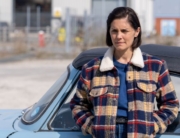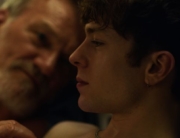
Documentary filmmaker Heidi Ewing (of the Academy Award nominated Jesus Camp) makes her narrative fiction debut with I Carry You with Me and does so with a clear, confident cinematic eye and striking realism.
Based on a true story, it follows the lives of two gay Mexican men across the span of several decades as they find love, endure discrimination from their families and society, and traverse the dangerous border crossing into the United States to start a new life. The older versions of the two protagonists, Iván and Gerardo, are played by Ewing’s real-life subjects, while their younger selves are portrayed by actors. Ewing masterfully intertwines documentarian realism with fictionalized drama that adds extra cathartic weight to a seemingly familiar story.
The film opens with a sober, contemplative voice-over while the distraught face of an older, tired-eyed man sits in a subway car, staring at his reflection in a window, longing for the day when he can return to his home in Mexico. This is Iván. We cut to Puebla City, 1994, where 20-something-year-old Iván (Armando Espitia) washes dishes and cleans toilets in a restaurant. Having graduated from culinary school, he hopes to one day become a chef. One night, he goes to a gay club with his best friend and confidante, Sandra (Michelle Rodríguez). There, he meets Gerardo (Christian Vásquez), who is openly gay.
Their relationship does not hit off immediately because Iván has a son from a previous relationship—his ex-wife may not let him see his son again if she finds out he’s gay. From there, the story cuts back and forth between Gerardo and Iván’s young adult lives and their rough childhoods as they struggle through the patriarchal norms beset by their austere fathers. These crucial flashbacks, while compelling, occur sporadically, jumping in and out of the main story line, which may take audiences out of the moment.
For Ewing, this erratic time line gives the story a dreamy overcast reminiscent of a fragmented memory. Her cinematographer, Juan Pablo Ramírez, shoots many of the actors and scenes in the shadows, which evokes an almost foreboding aura that pairs naturally with the lamenting voice-over. But these long, dreamy shots also make the story drag at times. Strong dramatic action points are broken up by overly long, panning shots of the characters’ contemplative gazes into space. It feels melodramatic and less emotionally cohesive than what a linear narrative structure could’ve achieved.
Nevertheless, there are plenty of subtle, little moments that more than make up for some of the film’s slower moving parts—such as an awkward and tense dinner scene between Iván and Gerardo’s homophobic father and the amusing banter between Iván and Sandra. The most compelling actors are the real-life Iván and Gerardo. Ewing, a documentarian veteran, seems most attune at following her real-life subjects, and by the end of it, I wanted more of them.
Overall, I Carry You with Me is a familiar but important love story that highlights the plight of the LGBTQ+ community in Mexico as well as what it means to find a place one can truly call home.






Leave A Comment